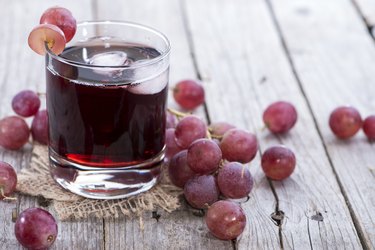
Did you know that a cup of grape juice will provide your recommended vitamin C intake? Grape juice benefits are plentiful, and even half a cup can go a long way in supplying those benefits.
Tip
Try incorporating grape juice into your diet by drinking half a cup per day or using it in juice blend recipes.
Video of the Day
Grape Juice Benefits
An article by Mayo Clinic suggests that grape juice has many of the same heart-healthy benefits as red wine. Among those benefits are: helping maintain a healthy blood pressure, decreasing the risk of blood clots and the amount of "bad" cholesterol and preventing damage to blood vessels in your heart. Likewise, grapes are rich in flavonoids, antioxidants that reduce oxidative stress.
Video of the Day
One September 2013 study in Critical Reviews in Food Science and Nutrition found that grapes have strong antioxidant activity, stymieing the proliferation of cancer cells and suppressing the clustering of platelets, while also reducing cholesterol levels. Overall, evidence has associated grape consumption with lowered risk of certain chronic diseases including cardiovascular disease.
Another study from January 2011 in the Journal of Medicinal Food, with a small sample size of 85 individuals, found that grape juice benefits immunity in healthy, middle-aged human subjects. The study tested whether grape juice alters the function of gamma delta T cells — which are important in immune surveillance — and found that it did. The gamma delta T-cell level, as well as the vitamin C levels in those who consumed grape juice increased.
Grape Juice Nutrition Facts
As little as half a cup of grape juice can yield benefits. According to the United States Department of Agriculture (USDA), half a cup of grape juice provides 50 percent of the daily recommended intake of vitamin C. The high levels of vitamin C can help in immune system functioning and stave off disease.
Furthermore, grapes are a good source of vitamin K and carbohydrates in the form of simple sugars, says the California Department of Public Health.
The USDA provides a breakdown of the vitamins and nutrients in grape juice, indicating that 1 cup of grape juice contains nearly 1 gram of protein, 263 milligrams of potassium, about 8 milligrams of choline, 144 micrograms of Lutein + zeaxanthin, 20.2 IUs of vitamin A and about 1 microgram of vitamin K.
Despite, their nutrient-rich content, there are grape juice side effects. According to MedlinePlus, eating large quantities of grapes may cause diarrhea. Other potential side effects of grapes or grape products include nausea, vomiting, indigestion, upset stomach, dry mouth, headaches, infection, sore throat and more.
Recipes With Grape Juice
With all the health benefits of grapes, you may want to find ways to incorporate the fruit as well as the juice into your diet. The USDA suggests storing grape juice in unopened plastic bottles in a cool, dry place then refrigerating once opened. They also recommend simple-to-make grape juice recipes.
You can mix half a cup of grape juice with half a cup of seltzer, for a refreshing fruity drink. USDA also recommends a grape juice and fruit freeze, which involves blending grape juice, lemon juice, canned mixed fruit, cinnamon and nonfat yogurt. Once blended you can pour over shaved ice to serve.
If you have a sweet tooth, you can try a creamy grape dessert. Blend one cup of grape juice, half a teaspoon of lemon juice, two tablespoons of sugar and two cups of low-fat vanilla ice cream. You can serve this creamy grape dessert in a bowl or as a drink.
- Mayo Clinic: "Does Grape Juice Offer The Same Benefits As Red Wine?
- Journal of Medicinal Food: "Regular Consumption of Concord Grape Juice Benefits Human Immunity"
- Critical Reviews in Food Science and Nutrition: "Grape Phytochemicals and Associated Health Benefits"
- California Department of Public Health: "Harvest of the Month"
- USDA: "Grape Juice"
- USDA: "Household USDA Foods Fact Sheet"
- MedlinePlus: "Grape"
- “Pyschology Today”; High on Grape Juice; Lauren Aaronson; March 22, 2005